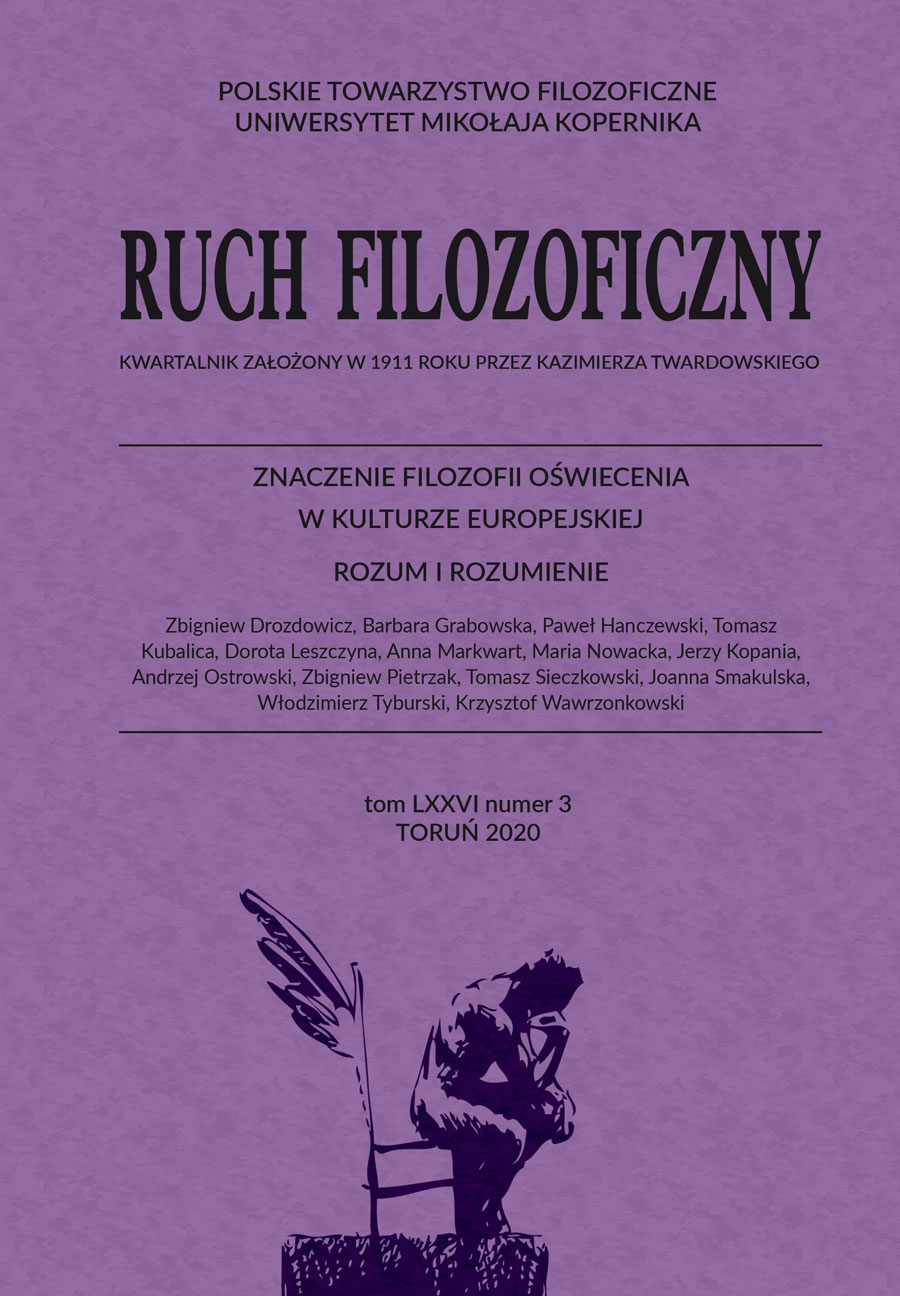Hume’s Atheological Reason
DOI:
https://doi.org/10.12775/RF.2020.040Keywords
Hume, atheism, religion, naturalization of belief, proof of God’s existenceAbstract
Hume’s naturalism, the consequence of which is not only the reduction of the cognitive powers to sophisticated instincts but also the destruction of the epistemological aspirations of theological speculation, forced, contrary to the opinion prevailing quite commonly in Hume’s times, a redefinition of the way of investigating religious issues within philosophy. The Dialogues Concerning Natural Religion is still a critical text, seemingly removing religion beyond the realm of (epistemological) reason. Still, the simultaneously written the Natural History of Religion is a positive exposition of what Hume believes a philosophy of religion should be. In this paper, I would like to look at Hume’s strategy of criticizing the objective claims of theology and at the project of naturalizing religion and making a reflection on it a part of scientific rather than metaphysic investigation.
References
Bailey Alan, Dan O’Brien. 2014. Hume’s Critique of Religion: „Sick Men’s Dreams”. Dordrecht: Springer.
Berkeley George. 1999. Principles of Human Knowledge. Three Dialogues. Oxford: Oxford University Press.
O’Connor David. 2001. Hume on Religion. London: Routledge.
Costelloe Timothy M. 2004. „In Every Civilized Community: Hume on Belief and the Demise of Religion”. International Journal for Philosophy of Religion 55: 171–185.
Dennett Daniel. 2007. Breaking the Spell. Religion as a Natural Phenomenon. London: Penguin Books.
Gascoigne John. 1989. Cambridge in the Age of the Enlightenment. Science, Religion and Politics from the Restoration to the French Revolution. Cambridge: Cambridge University Press.
Gaskin John Charles Addison. 1998. Hume’s Philosophy of Religion, 2nd edition. London: MacMillan.
Grzeliński Adam. 2010. Człowiek i duch nieskończony. Immaterializm George’a Berkeleya. Toruń: WN UMK.
Hochfeldowa Anna. 1962. „Dawida Hume’a Dialogi o religii naturalnej”. W: Dawid Hume, Dialogi o religii naturalnej, Warszawa: PWN, VII–LVI.
Hudson Wayne. 2009. The English Deists. London: Pickering & Chatto.
Hume David. 2004. Badania dotyczące rozumu ludzkiego, przeł. Tomasz Sieczkowski i Dawid Misztal. Kraków: Zielona Sowa.
Hume David. 1962. Dialogi o religii naturalnej. Naturalna historia religii, przeł. Anna Hochfeldowa, Warszawa: PWN.
Hume David. 1963. Traktat o naturze ludzkiej. T. 1–2, przeł. Cz. Znamierowski. Warszawa: PWN.
Jakubiak Milena. 2013. „Religia według Hume’a”. Analiza i Egzystencja 22: 189–218.
Kail Peter J. E. 2007. „Understanding Hume’s Natural Philosophy of Religion”. The Philosophical Quarterly 57/227: 190–211.
Lad Sessions William. 2002. Reading Hume’s Dialogues. A Veneration of True Religion. Bloomington & Indianapolis: Indiana University Press.
Locke John. 2000. The Reasonableness of Christianity as Delivered in Scriptures, Oxford: Clarendon Press.
Russell Paul. 1998. „Skepticism and Natural Religion in Hume’s Treatise”. Journal of the History of Ideas 49: 247–265.
Russell Paul. 2008. The Riddle of Hume’s „Treatise”. Scepticism, Naturalism, and Irreligion. Oxford: Oxford University Press.
Russell Paul. 2016. „Hume’s Philosophy of Irreligion and the Myth of British Empiricism”. W: The Oxford Handbook of David Hume, ed. Paul Russell, New York: Oxford University Press: 109–37.
Segal Robert A. 1994. „Hume’s Natural History of Religion and the Beginning of the Social Scientific Study of Religion”. Religion 24: 225–234.
Shapin Steven. 2000. Rewolucja naukowa, przeł. Stefan Amsterdamski. Warszawa: Prószyński i S-ka.
Sieczkowski Tomasz. 2008. „Qui pro quo Dialogów, czyli pytanie o status teologii naturalnej”. Nowa Krytyka 20–21: 265–301.
Sieczkowski Tomasz. 2017. David Hume i krytyka episteologii. Łódź: Wydawnictwo Uniwersytetu Łódzkiego.
Downloads
Published
How to Cite
Issue
Section
Stats
Number of views and downloads: 1017
Number of citations: 0



